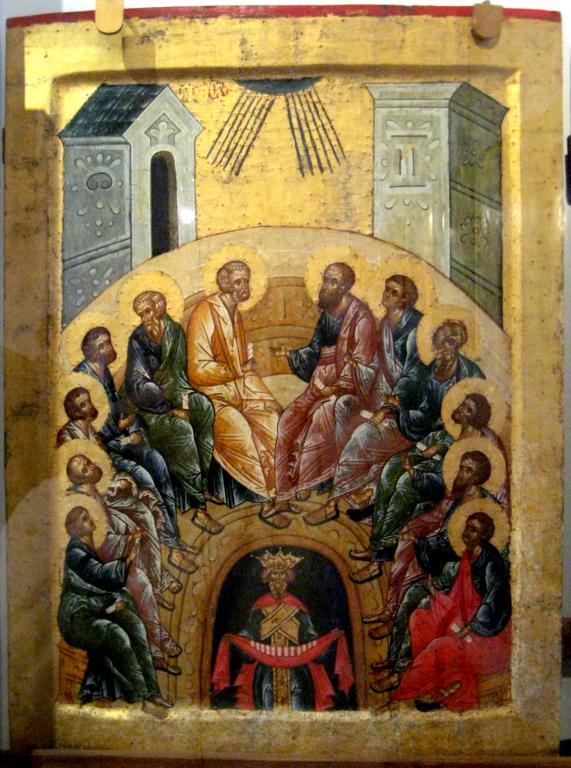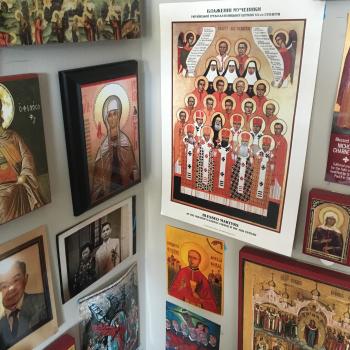
On Pentecost, we in the Byzantine churches have Kneeling Vespers. To the extent that we aren’t latinized, we’ll do something like the full Vespers service, not just the kneeling prayers. The problem is that the thoroughly non-latinized priest at my church had a hip replacement and broke his ankle. He can’t kneel, and neither can the six other Ukrainian babas in their nineties. So what happened is that I knelt and we sang the ‘Heavenly King’ together: Heavenly King, Paraclete, Spirit of truth, who are everywhere and fill all things, Treasury of Blessings, Bestower of Life, come and dwell within us, cleanse us from all that defiles us, and O Good One, save our souls.
It was nice. We haven’t been singing that since Pascha, so it was nice to bring it out again.
It’s also in the sixth samohlasny tone, the ones we use for Vespers. I call Tone 6 Samohlasny the ‘all-purpose tone.’ I first learned it in a Typika service, the readers’ services that are a bit like training wheels for the real Divine Liturgy. One of the special parts of a Typika service that is not in Divine Liturgy is a part after the Gospel that is sung in Tone 6 Samohlasny:
Remember us, O Lord, when You come into your kingdom.
Remember us, O Lord, when You come into your kingdom.
Remember us, O Lord, when You come into your kingdom.
The heavenly choir praises You and says:
Holy, holy, holy Lord of Sabaoth,
heaven and earth are full of your glory.Come unto Him, and be enlightened,
and your faces shall not be ashamed.The heavenly choir praises You and says:
Holy, holy, holy Lord of Sabaoth,
heaven and earth are full of your glory!Glory be to the Father and to the Son
and to the Holy Spirit.The choir of angels and archangels,
with all the heavenly host, praises You and says:
Holy, holy, holy Lord of Sabaoth,
heaven and earth are full of Your glory!Both now and ever, and for ages of ages. Amen.
That’s not the only place that tone is used. The next time I heard it was at Sunday Matins, again after the Gospel before the Lytia. In Sunday Matins, what happens at the apex of the service is a reading of a Resurrection Gospel, an account of Jesus being raised from the dead. What then happens is that the Gospel book is brought out among the people, and we venerate it and receive a blessing from the priest. As that is happening, we sing the Hymn of the Resurrection about the worship of our Lord Jesus Christ and our veneration of the Cross and the holy Resurrection. Then a reader chants Psalm 50 (‘have mercy on me, O God’), and then the following commentary is sung in Tone 6 Samohlasny:
Glory to the Father and to the Son and to the Holy Spirit.
Through the prayers of the apostles, O merciful Lord,
cleanse me from the multitude of my transgressions.Both now and ever, and for ages of ages. Amen.
Through the prayers of the Theotokos, O merciful Lord,
cleanse me from the multitude of my transgressions.Have mercy on me, O God, according to Your loving kindness,
according to the multitude of Your tender mercies blot out my transgressions.Jesus is risen from the tomb, as He foretold,
granting us eternal life and great mercy!
I like to think of this part of our weekly Sunday Matins as practice for Paschal Matins, the climactic service of the Feast of Feasts. There, we do the Hymn of the Resurrection and the last verse (‘Jesus is risen from the tomb, as He foretold…’) in the middle of the Paschal Canon after the sixth ode, which is the part of every canon where the mystagogical meditation on the meaning of the canon we are singing is delivered through the kondak hymn. We sing this part in Tone 6 Samohlasny after the kondak.
Tone 6 Samohlasny is also used for the funeral. In the books marked by Fr Roman Galadza, Tone 6 is denoted as the tune of ‘Heavenly King.’ The first time we use Tone 6 in the Order of Burial is after the chanting of the Stichera of St John of Damascus in all eight samohlasny tones and the Beatitudes in another version of Tone 6. Before the prokeimen that signals a reading of the Epistle (and ultimately, the Gospel), we have this in Tone 6 Samohlasny:
Glory to the Father to the Son and to the Holy Spirit.
I adore God the Father because He is eternal, and God the Son because He is begotten of the Father, and God the Holy Spirit because He proceeds from the Father, and is resplendent with the Father and the Son.
Both now and ever, and for ages of ages. Amen.
O Virgin, how did you give forth from your breast this abundance of milk? How did you sustain the Sustainer of all creation? of whom it is written that He made water gush from the rock, a stream to quench the thirst of the people.
Tone 6 Samohlasny also concludes the section of the Final Kiss as the people wish the departed a final farewell, leading into the panakhyda that culminates in the Everlasting Memory (vichnaya pam’yat) that is perhaps the most famous part of Orthodox funeral services. Closing out the Final Kiss, we sing, again to the melody of ‘Heavenly King’:
Glory be to the Father and to the Son and to the Holy Spirit.
Listen to the words of farewell of our beloved departed: O you, my brethren and beloved ones, my acquaintances and relatives, when you see me lying voiceless and deprived of breath, you well may weep for me: for yesterday I spoke with you, and suddenly, the terrible hour of death fell upon me. Come, all you who love me and greet me with a final kiss, for never again shall I walk with you or talk with you. I go before the Judge where there is no respect of persons, where slave and master stand together, king and soldier, rich and poor in equal worthiness, for each is glorified or shamed according to his deeds. But I beg you all and entreat you unceasingly to pray Christ God for me, that I be not sent to the place of torment because of my sins, but that He may place me where the light of life is shining.
Both now and ever, and for ages of ages. Amen.
Save those who place their trust in you, O Mother of the Sun that has no setting. O you who bore God, we beseech you, by your prayers entreat the all-merciful God, that He might grant rest to the one who has been taken from us with the spirits of the just, making them an heir of divine good things in the place of the righteous, in eternal memory.
There are probably more examples of Tone 6 Samohlasny that I am forgetting, but you get the point. Tone 6 Samohlasny is used for everything, and it is referred to as the ‘melody of Heavenly King.’
Today is the Monday of the Holy Spirit. It is the first day we open our prayers with the Usual Beginning and instead of singing ‘Christ is risen from the dead’ in place of Heavenly King, or skipping it altogether during the Mission Days between Ascension and Pentecost, it is back in its rightful place for another year. It is a declaration that the Holy Spirit, the Paraclete, the Spirit of Truth has been poured out upon the earth and fills everything.
But what does this mean? At least at the level of my participatory experience – and thus without knowledge of the intentions of our holy mothers and fathers (knowledge which I am sure a liturgist somewhere in our church might be more than happy to supply – I am particularly interested in the thoughts of those of our growing number in Vienna) – it seems to me that the Kyivan Church in her wisdom has assigned Tone 6 Samohlasny so that we who sing it come to understand the full extent of what it means for the Holy Spirit to fill all things.
First, from Sunday Matins and its culmination in Paschal Matins, we come to understand how the Resurrection relates to us in bestowing life to those in the tombs. The Spirit is the Treasury of Blessings and Bestower of Life because Jesus is risen from the dead, as he foretold, granting us eternal life and great mercy. It is, after all, the holy Resurrection of our Lord by which he tramples death by death and to those in tombs bestows life. The Holy Spirit is the agent of that bestowal; through the Spirit, we share in the risen life of Christ.
So too, by the Spirit, we are cleansed from all that defiles us, the multitude of our sins, as we sing at Matins. The resurrectional life of Jesus Christ is the agent of this purification. As the Spirit fills all things, we sing the all-purpose tone, declaring what it means for the earth to be filled by G-d himself. The defilement of sin is cleansed; it is on such cleansing that our passing from death to life is predicated.
Finally, the Spirit saves our souls. Is this not why we close out the Order of Burial with Tone 6 Samohlasny? When we sing ‘Everlasting Memory,’ we are not saying that we will remember the dead forever or that the dead’s memory will somehow live forever in a kind of legacy. ‘Everlasting memory’ is clarified by the words of the Typika service – ‘Remember us, O Lord, in your kingdom’ – these are the words of the thief to Jesus as they were hanging on the cross, to which our Lord says: today, you will be with me in paradise. Everlasting memory is the guarantee of the Resurrection, that the finality of death is not in fact final because those in the tombs have been bestowed life. Our souls will re-inhabit resurrectional bodies. This is the meaning of salvation.
Experientially, Tone 6 Samohlasny is the all-purpose tone because the ‘Heavenly King’ is the all-purpose song in which our entire theology of Christ Our Pascha is encapsulated. As a friend pointed out to me recently, the icon of the Pentecost features King Cosmos coming out of the darkness as the Spirit is poured out onto the disciples. The Spirit fills all things, and now the World holds in his hands the scrolls of the Apostles. The apostles’ doctrine is revealed to be the truth of the world; no wonder today’s epistle reading for Monday of the Holy Spirit is from the part of the letter of the Holy Apostle Paul to the Ephesians where he focuses on the concrete practices of everyday life in the power of the Spirit. As we sing in the prokeimen that precedes this reading: Save Your people, O Lord, and bless Your inheritance.
So too, the Gospel for today is taken from the eighteenth chapter of the Gospel according to the Holy Evangelist Matthew, the same chapter that evangelical Protestants love to read prescriptively for how to conduct church discipline, often leading to its misapplication in keeping church scandals secret in a kind of wink-wink-nod-nod private consensus that gaslights victims of abuse and blackmails those who don’t want to participate in such treachery as enemies of the church. But placed into its proper liturgical perspective of Monday of the Holy Spirit and in light of these meditations on the all-purpose tone, we hear that the power of the assembled church to loose and bind on earth is predicated on the presence of Christ among his people, where two or three are gathered. This power is made possible because of the Paraclete that the ascended Lord has sent to fill all things. As the Pentecostal tropar goes: Blessed are You, O Christ our God who revealed the fishermen as most wise by sending them the Holy Spirit; through them You caught the entire world. Loving Master, glory to You.
Tone 6 Samohlasny seems to me, then, like the tune that is supposed to remind us of how the theological contemplation of heavenly realities is practical upon the earth. We thus declare in the Order of Burial that the G-d we worship is Triune and that he was made flesh to us by the Virgin Theotokos. By the Spirit, his energies fill all things. Because of the Paraclete sent among us, the church is given power and the world declares the truth of the apostles’ teaching. Through the Heavenly King, our souls are saved, and therefore we can sing Everlasting Memory in the certain hope that our Lord Christ’s trampling death by death bestows to those in the tombs eternal life. Thus, as we sing today in our Pentecostal antiphon, The heavens tell the glory of God, and the firmament declares the work of His hand. Day to day pours forth the message and night proclaims this knowledge to night. Their utterance has gone forth into all the earth, and their words unto the ends of the world.
Let us therefore worship together on this Monday of the Holy Spirit through the practice of our everyday lives that are filled by the Paraclete with the kondak: When the Most High came down and confused the tongues, He parted the nations. When He divided the tongues of fire, He called all to unity; thus with one voice we glorify the all-Holy Spirit.











